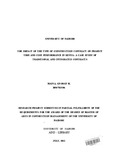| dc.description.abstract | Many construction projects suffer time and cost overruns. In addition to impairing the economic feasibility of projects, this also provides a fertile ground for costly disputes and claims. This study, thus sought to investigate the impact of the type of construction contract on project time and cost performance in Kenya. This study categorized the various contracting methods into two major groups. The two categories are traditional contracts (where design and construction is separate), and integrated (single source) contracts (where design and construction are combined). While it is noted that there were shortcomings that led the construction industry to explore new methods of contracting, there are no concrete figures on the extent to which the new types of contracts have been able to improve project performance. Based on the contractors and design consultants' experiences and perceptions, quantitative data was collected through questionnaires, and analyzed.
The results of the analysis revealed majority of projects were carried out using traditional contracts and not integrated contracts. However, the projects that used integrated contracts had a lower mean time and cost overrun compared to those that used traditional contracts. Integrated contracts can give better time and cost performance, implying that they are more effective than traditional contracts. The study further established that the acceptance of possibility of good performance in use of integrated contracts is wide even among the people who have been using traditional contracts, and lack of use of the integrated contracts can mainly be attributed to lack of opportunity or knowledge to use them.
The study recommends that the stakeholders in the construction industry should be encouraged to use appropriate contracts for construction projects, in an attempt to improve projects time and cost performance. In particular that integrated contracts be encouraged to all stakeholders for public and private projects and professional and educational institutions, so as to improve efficiency in the industry. | en_US |

